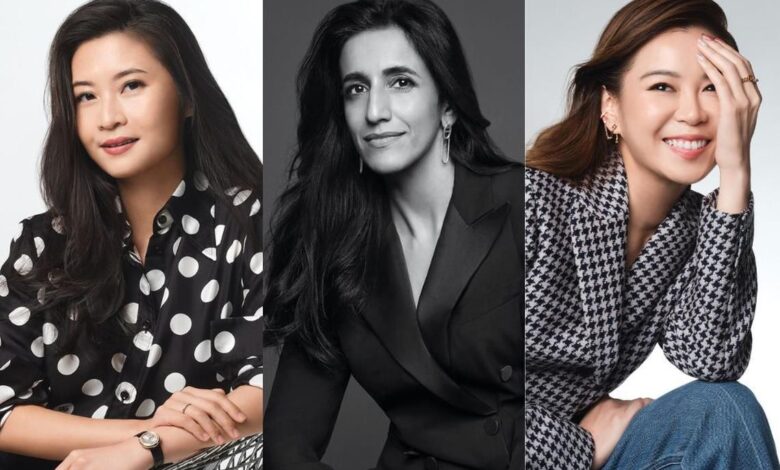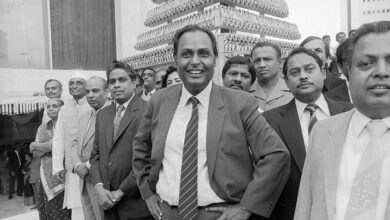8 Female Tech Founders Changing The Game In Health, Travel, Finance And Beyond

By Aaron Kok and Shermin Ng – published
In this year’s edition of BAZAAR’s annual Power List, we recognise eight female innovators in Singapore who are forging new and exciting pathways ahead in their respective industries—from leading the AI boom to changing the way we travel.
Caecilia Chu, 40, co-founder and CEO of YouTrip
Top, Dolce&Gabbana. Trousers, Ralph Lauren. Pumps, Roger Vivier. Ring, Hermès. Cartier watch, Chu’s own.
Photo: Wee Khim
“Power lies in the ability to inspire others, advocate for positive change, and equip them with the tools they need to make a difference themselves.”
It’s no overstatement that Caecilia Chu of YouTrip has changed the way we travel. The multi-currency mobile wallet founded in 2018 has garnered popularity for its user-friendly interface and favourable exchange rates, empowering users to make hassle-free transactions without excessive fees. With years of experience that have proven invaluable in making various business decisions, Chu is comfortable with the unpredictability of entrepreneurship. “As a founder, you’re continuously faced with new problems to solve, decisions to make, and paths to forge. However, innovation rarely occurs within the familiar. It thrives on the edges, where pushing boundaries and embracing the unknown sparks the creation of something truly impactful,” she muses.
“Early on, power felt like climbing the corporate ladder. But building YouTrip flipped that script. Now, power is about impact. It’s using technology to create positive change, and that grows with every person and business we financially empower,” says Chu, who feels most powerful when surrounded by her talented and diverse team. Chu shares that one of her greatest accomplishments to date is YouTrip’s “gender-balanced workforce” and having senior women leaders across its critical functional teams including product, technology, marketing and finance. “They are an inspiration to fellow female colleagues and younger women who are considering a career in fintech. Gender should not be a hindrance to their career.”
Ayesha Khanna, 50, co-founder and CEO of Addo AI
Blazer; trousers, Ralph Lauren. Pumps; rings (on right hand), Dior. Earrings, Hermès. Ring (on left hand), Khanna’s own.
Photo: Wee Khim
“Power is having influence with integrity. It’s the ability to effect change and to inspire action. True power comes from using your influence to uplift others, to create opportunities, and to drive positive change.”
Over the years, Dr Ayesha Khanna, the strategic advisor to leading corporations and governments around the world on AI, data and smart cities, has come to understand that “power is about self-belief, confidence, and the courage to use your voice”. She feels most powerful when she’s using her skills and expertise to solve real-world problems—whether it’s developing innovative AI solutions, mentoring young women in tech, or advocating for greater diversity and inclusion in the industry. “I feel a sense of empowerment when I’m making a tangible difference in the lives of others,” shares Khanna.
One common misconception about female entrepreneurs she’d like to clear up? That women are less ambitious than their male counterparts. “Women are just as driven and successful as men, but they often face unique challenges and biases that can make it harder to succeed. Women in Asia for example, are increasingly highly educated, with advanced degrees in computer science, engineering and related fields. We’re not just coding; we’re leading research teams, founding startups, and driving innovation at major tech companies.”
Related article: 18 Singaporean Brands That Have Gone Global
Minna Lim, 40, founder of Lovpipo
Dress; earrings; ring, Louis Vuitton.
Photo: Wee Khim
“To me, there is a lot of power in the human connection. Seeing my clients find love through Lovpipo is the continuous motivation that drives me.”
As a recently divorced mother of three trying to get back in the dating pool, Minna Lim turned to dating apps, and in doing so, she realised how lacking these apps were in cultivating lasting relationships. So rather than remain resigned and uncontented, Lim set out to build her own app. “I didn’t come from an entrepreneurial background, and I had no knowledge of how to start an app,” she admits. Still, that didn’t daunt her as she was determined to address a gap in the dating app market, and to create one for herself. Lim dived into a flurry of online lessons and tutorials to equip herself with the know-how of creating an app.
Lovpipo now hosts over 5,000 active users, and has a slew of unique features, including a function where introverts can view 20 potential matches at one time before arranging a meet-up. It also allows users to keep notes on the matches, add a location and mobile number verification to protect them from love scams.
Antoinette Patterson, 36, co-founder and CEO of Safe Space
Jacket, & Other Stories. Earrings, Hermès. Ring (on index finger), Kate Spade New York. Ring (on ring finger), Patterson’s own.
Photo: Wee Khim
“Power is the ability to influence positive change and make a meaningful impact on people’s lives. It’s about having the courage to innovate, the resilience to overcome challenges, the perseverance to keep going and yet still have the empathy to understand and address the needs of others.”
Antoinette Patterson’s firsthand experience with burnout and recognising the stigma and barriers people face in seeking help led her to co-founding Safe Space—a digital platform providing accessible, comprehensive services aimed at helping people maintain mental wellness. Launched in 2019, the platform saw a marked increase in users when the Covid-19 pandemic hit Singapore and the circuit breaker measures were implemented.
Patterson’s career journey, from being in corporate roles to founding Safe Space, has profoundly reshaped her relationship with power. She shares that feeling powerful is inner work: “It’s about my own self-awareness, the ability to uplift others behind the scenes, and the drive to create solutions that improve lives.” The tangible, positive impact of Patterson and her team’s work at Safe Space empowers her. “Whether it’s a client leaving a testimonial thanking us that they were able to find the help they needed or when I give keynote speeches to entrepreneurs and see that spark ignited in their eyes, these moments affirm the purpose and drive behind what I do and how I envision living my life with no regrets,” she says.
Serene Cai, 32, co-founder of Speedoc
Blazer; rings, Dior. Jeans, Gucci. Earring, Hermès.
Photo: Wee Khim
“Being in a position to serve, and having the responsibility of providing shoulders for future generations to stand on—that’s powerful to me.”
“In the healthcare industry, people come to us for help in times of illness and weakness and need; and I’ve always found it our greatest accomplishment to know that we’ve created something where every single day, we impact people’s lives for the better,” Serene Cai tells us on the greatest pleasure of running her digital health startup, Speedoc. Launched in 2017, at a time when telemedicine was still foreign to many, the platform that connects patients with healthcare providers now serves more than 180,000 active users.
Two years ago, Speedoc secured a pre-series B funding of US$28 million (S$37.6 million), allowing Cai and her team to expand its operations. In reflecting on her journey as a healthcare entrepreneur, Cai shares that entrepreneurship tends to be more male-dominated “because it historically rewards the values that men are associated with—risk-taking, boldness, daring, courage. But hey! Women are excellent at creating communities, forging connections and problem-solving, and these values are perfectly suited to entrepreneurship too.”
Related article: Raissa Gerona Of Revolve On What It Takes To Build A Billion-Dollar Brand
Dr Lynne Lim, founder and CEO of NousQ
Cape; top, Gucci. Trousers; brooches, Lim’s own.
Photo: Wee Khim
“Power is the ability to influence and shape people and things for great impact. It’s only worthwhile if used for the greater good. It is needed to accelerate and amplify great ideas, help many, and effect important changes. Real power is super quiet, so much so that it often gets mistaken for weakness.”
It took over a decade and 20 prototypes until the final version of CLiKX—the world’s first robotic, automated and sensor-controlled hand-held applicator set to revolutionise ventilation ear tube surgery—was developed. “I had spent many years on R&D and gone down the route of academician, researcher, clinician, and administrator. But it dawned on me that without embarking on the business, the CLiKX device would not help a single patient at all,” says Dr Lynne Lim of medtech start-up NousQ.
Beyond the CLiKX device, Dr Lim, who’s in her 50s, has ambitions to innovate best-in-class surgical solutions that address unmet needs and give voice to patients. The top prize winner of this year’s Cartier Women’s Initiative Awards in the Science & Technology Pioneer category believes that the biggest opportunities for female entrepreneurs lie in the elderly domain as “females are often caregivers and more sensitive to their needs”. On the difficulties of entrepreneurship, she states: “The hardest part is that business founders have hardly any time left for themselves. It is also an incredibly lonely journey despite all the noise, frenzy and high stakes.”
Anna Haotanto, 39, founder of Zora Health
Blazer, Kenzo. Ring, Kate Spade New York. Skirt, Haotanto’s own.
Photo: Wee Khim
“True power lies in empowering others, fostering innovation, and creating an environment where everyone feels valued and capable of contributing their best. It’s about having the vision to see what needs to be done and the resilience to see it through, all while maintaining integrity and empathy.”
From her own well-being came forth Anna Haotanto’s new project, Zora Health. “I’ve had a lot of health issues. Last year alone, I had five surgeries,” she openly shares. Her initial suspicions that she was experiencing perimenopause led her down a rabbit hole of research on female fertility health, which then brought her to the realisation that there was a lack of reliable medical channels for women. “The female fertility market is very overlooked,” she points out, noting that this was a $54 billion market globally. Zora Health was created to address the underserved fertility market, and has grown to become one of Asia’s leading fertility, reproductive and family health online platforms.
From providing clients with access to over 80 of the top fertility clinics across 16 countries and integrating corporate education to shed light on the importance of fertility health, Zora Health has quickly become a single-stop site for individuals looking for health and fertility guidance. “We are building solutions we wish existed,” Haotanto tells us. “In five years, we want to build the most comprehensive ecosystem of healthcare providers and an integrated platform that provides trusted resources and financing options.”
Related article: 20 Films To Watch For A Hit Of Girl Power
Janine Teo, 42, founder and CEO of Solve Education!
Blazer; shirt; earrings; rings, Louis Vuitton.
Photo: Wee Khim
“Power is the ability to effect positive change and uplift others. It’s not about control or dominance but about inspiring and enabling people to reach their full potential.”
Entrepreneurship is not for the faint of heart, but embracing a growth mindset has allowed Janine Teo to see failures as learning opportunities. “I’ve learnt that being compassionate is crucial for long-term success. It fosters a culture where we learn from mistakes, support each other, and celebrate achievements. This approach has helped us deliver over 25 million lessons to date,” says Teo. It naturally extends to how she perceives power. “I see power as the capacity to open doors to opportunities and provide tools for marginalised communities to thrive. It’s about making a lasting impact and empowering others to continue the journey towards progress and equity.”
The transformative impact of Solve Education! remains one of Teo’s proudest achievements—making a real difference drives her to keep doing what she does. “I knew that through innovative tech solutions, we could create accessible, effective educational tools,” shares Teo, whose passion for leveraging technology stems from her background in computer engineering. “Seeing more than a million users from marginalised communities gain access to quality education through our AI-driven tools has been incredibly fulfilling.”
Photographed by Wee Khim
Styled by Gracia Phang
Makeup: Rina Sim using Chanel Beauty
Hair for Caecilia Chu, Ayesha Khanna, Antoinette Patterson, Lynne Lim, Janine Teo: Jenny Lee using Organethic
Hair for Serene Cai, Minna Lim, Anna Haotanto, Claudia Poh: Aung Apichai / Artistry Studios using Kevin Murphy
Photographer’s assistant: Ivan Teo
Stylist’s assistant: Tara Amelia Sharil
Source link


